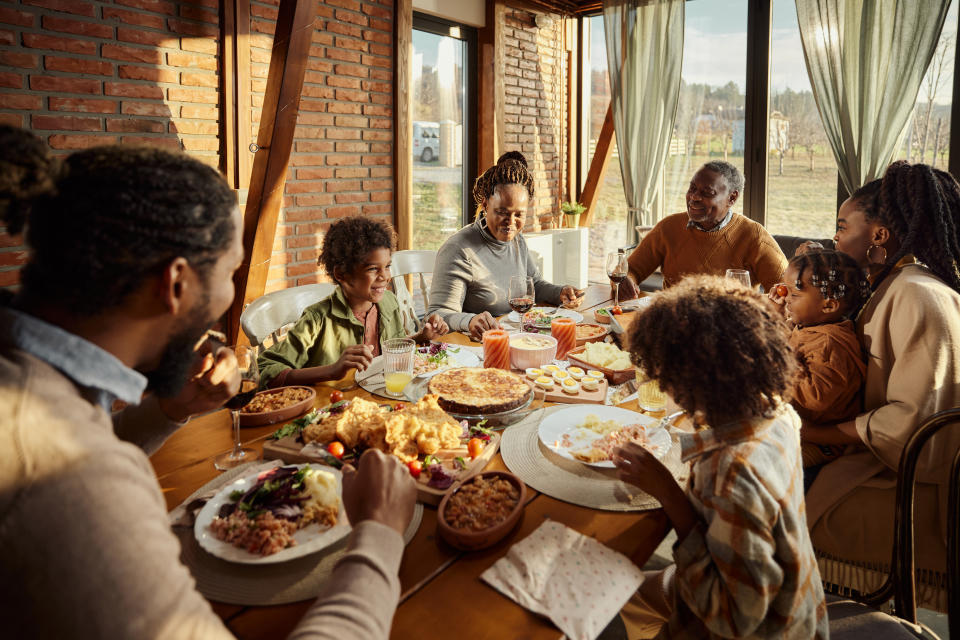Here Is The Best Time Of Day To Eat Dinner According To Experts

We’re nearly two years into the pandemic and while some aspects of life are starting to feel slightly “normal,” we’re still far from the days of 2019 when we felt safe packing into a crowded train during rush hour, going mask-free in crowds and dining indoors with friends.
As a result, we’ve adjusted many of our habits — including our eating habits. For those who used to eat three square meals a day, maybe now they’re more into the grazing lifestyle. And 7 p.m. used to feel like the “official” dinnertime, but since many of us are still working from home, it’s now more like 6 p.m. … or even earlier, if we’re being honest.
— Kristen Schaal (@kristenschaaled) April 25, 2020
6:30am Breakfast. 10:30am Lunch.4:30pm Dinner.8:00pm Dessert.Society has been doing mealtimes totally wrong.
Alisa Vitti, a functional nutritionist and the CEO of Flo Living, said this isn’t necessarily a bad thing, and that 7 p.m. always felt like the “official” dinnertime because of “corporate culture, happy hour culture, and commuter reality — not because it’s biologically aligned.”
So that begs the question: Is there an “ideal” time to eat dinner? We spoke with experts on the topic to find out. Here’s everything you need to know.
The ideal dinnertime is ...

The answer to this question isn’t clear-cut, and as with most things, there’s going to be a range.
“Any time between 6 and 8 p.m. is an ‘ideal’ dinnertime,” registered dietitian Tracy Lockwood Beckerman told HuffPost. “That’s because it gives the average person enough time to digest before hitting the hay around 10 or 11 p.m.”
That being said, the ideal dinnertime will differ based on your circadian rhythm — or more specifically, if you’re an early bird or a night owl.
“It’s different for early birds versus night owls because the longer the night owls are up, the higher the odds they may go back for a late night snack,” Beckerman said. “Night owls should eat dinner later than early birds to reduce the chance of mindless snacking, empty calories and unnecessary munching late at night.”
Why you should be wary of eating dinner too late

There’s nothing wrong with a bedtime snack, but eating a big dinner too late could affect your sleep — and not in a good way.
“Being too full could negatively impact our sleep by possibly leading to acid reflux,” Beckerman said. “If there’s too much food digesting in your stomach and you lie down, it could potentially put pressure on your esophageal sphincter, resulting in unpleasant reflux.”
Additionally, “eating too close to bedtime can decrease the quality of your sleep, increase inflammation and can absolutely make weight management more difficult as well as increase the likelihood that you will experience night sweats or hot flashes,” Vitti said.
In other words, if you tend to go to bed on the early side, it might be in your best interest to eat dinner earlier, too.
How lunch factors into the equation

Yes, the pandemic (and working from home) has made a difference in when we eat dinner — but it’s also changed our lunchtimes. And according to Beckerman, we should factor that in when we think about the last meal of the day.
“The later you eat lunch, the later your body will be ready for dinner,” she said. “The earlier you eat lunch, the earlier your body will be expecting dinner.”
If you find yourself eating lunch at 11 a.m. (it happens), one easy solution to avoiding a 4 p.m. dinner is throwing in a balanced snack.
“This in-between snack will also prevent you from going into dinner famished, so you are less likely to unexpectedly overeat,” Beckerman said. “The snack will allow you to make a rational and balanced dinner decision because you will be making a choice with a fed and satisfied brain rather than a hangry, impulsive or fatigued brain.”
Does the ideal dinnertime differ based on gender?

It’s no secret that hormones affect just about everything, and that includes our eating habits. For women of reproductive age, being flexible might be more beneficial than being rigid with their mealtimes.
“Women in their reproductive years, especially during the luteal phase of their cycle [the phase after ovulation, or about two weeks in], need more calories and more slow-burning macros [nutrients like protein, carbs and fat] to keep blood sugar stable, keep PMS at bay, maintain a healthy weight and to have quality sleep,” Vitti said.
This means women should work on listening to their bodies when deciding what time to eat dinner, and even how much they eat.
It’s important for men to listen to their bodies, too, but their hormones fluctuate less, making this less of a necessity.
“Men don’t have an infradian rhythm, so they can stick to their same meal timing every 24 hours,” Vitti added, referring to the menstrual cycle, which is the most common type of infradian rhythm.
At the end of the day, what time you eat dinner really comes down to what works best for you.
“People should eat at a time that is realistic for their lifestyles and sleep habits,” Beckerman said. “That may mean eating a later lunch during the day if you know you won’t sit down for dinner until 9 p.m., which is totally OK!”
This post originally appeared on HuffPost.

 Yahoo Lifestyle
Yahoo Lifestyle 
